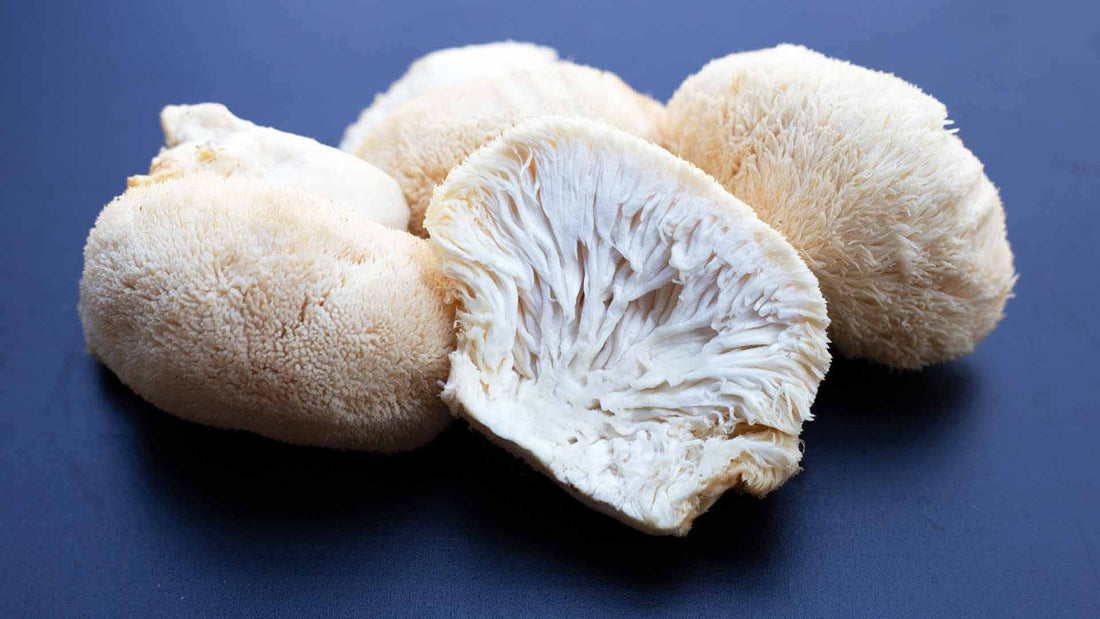
How Long Does It Take for Lion's Mane to Work? (In-Depth Look)
Category / newsAre you interested in taking Lion’s mane but know little about this unique medicinal mushroom? Maybe you’ve heard that it has the potential to boost cognitive function and help with overall mental health. We can all use a boost nowadays, but you’re probably wondering, “How long does it take for Lion's mane to work?”
Our complete guide will explore the answer to this crucial question in depth. We cover everything you need to know, including safety considerations, dosage recommendations, how long the effects last, and the incredible health benefits this fantastic fungus offers.
Let’s dive right into it!
At a glance:
- How Long Does it Take for Lion's Mane to Work?
- How Long Do You Feel The Effects?
- What is the Recommended Dosage of Lion's Mane?
- What is The Best Time of Day to Take Lion's Mane Mushrooms?
- How Often Is It OK to Take Lion's Mane?
- What are the Potential Benefits of Lion's Mane?
- Is Taking Lion's Mane Safe?
- What are the Potential Side Effects of Taking Lion's Mane?
- Final Thoughts
How Long Does it Take for Lion's Mane to Work?
So, you're excited to feel the effects of Lion's mane, but how patient will you need to be? The answer is that it depends.
The time it takes to notice results varies from person to person. Some may start to feel Lion's mane working in a few days, while for others, it could take several weeks or even months of regular use.
Factors like age, weight, metabolism, dosage, and whether you take Lion's mane on an empty stomach can all impact how quickly you notice effects. But in general, don't expect overnight results — think of Lion's mane as an investment in your long-term brain health and well-being.
Studies have found that cognitive improvements may appear after approximately one month of use.
Also, remember to consider the quality of your Lion’s mane mushroom supplement. Ensure you’re buying from a reputable source offering higher concentrations of better-quality mushrooms.
How Long Do You Feel The Effects of Lion's Mane and How Long Does It Stay In Your System?

Another common question is how long the effects of Lion's mane will last after they start to take effect.
Many people report feeling the brain-boosting benefits for several hours after a dose. Even after it's out of your system, the positive influence on your brain health can persist thanks to Lion's mane's ability to stimulate the production of nerve growth factor (NGF).
But how long does Lion's mane actually stay in your body? The half-life appears to be around 24 to 48 hours — meaning it takes a day or two for levels in your blood to decrease by half. However, we don't have precise data on how long this fungus lingers in humans. The duration likely depends on factors like the dose and your individual physiology.
What is the Recommended Dosage of Lion's Mane?
Are you planning to try Lion's mane and wondering how much to take? Experts typically recommend a dose of 500 to 3000 mg daily. Still, the dosage can vary depending on your goals and the form of mushroom you take (i.e., fresh, powdered, tinctured, or encapsulated).
It's wise to start on the lower end of the range — say 500 to 1000 mg — and gradually increase as you gauge your body's response. We recommend controlling your dosing with the best lion’s mane mushroom gummies. Gummies are easy to count, and you can take as many or as little as you want — even half or quarter gummies are easy to portion and consume.
This approach lets you find your "sweet spot" while minimizing any chance of side effects. As always, talk to your doctor before adding new supplements to your routine.
What is The Best Time of Day to Take Lion's Mane Mushrooms?

So you've got your Lon's mane and know how much to take — when's the ideal time to take it to maximize the brain benefits? Let's break it down by the time of day:
Morning
Popping your Lion's mane in the AM can be a great way to start the day on a brain-boosting note. You may notice enhanced focus, memory, and mental clarity as you tackle your morning to-do list. Lion's mane could help keep you humming along productively until the afternoon.
Gastrointestinal distress is one likely downside, so take Lion's mane with food if you're sensitive to supplements on an empty stomach. Also, if it boosts your energy levels too high, it could disrupt your sleep later that night.
Afternoon
If mornings don't work for you, consider taking Lion's mane in the afternoon — especially if you tend to hit a mental slump partway through the day. A good dose may help you power through that afternoon brain fog and stay sharp until evening.
One catch is that taking Lion's mane late in the day could be too energizing for some folks. If you take it later, you should time it at least a few hours before bed so it doesn't keep you up at night.
Evening
Taking Lion's mane at night could help you wind down, destress, and get your brain in a good space before bed. Some people report that it improves their sleep.
However, others find it revs them up too much if taken later in the day. If you're sensitive to the energizing effects, taking lion's mane at night could backfire and lead to a less restful snooze. You may need to experiment to see how your body reacts to PM use!
How Often Is It OK to Take Lion's Mane?

Lion's mane is generally well-tolerated, so it's likely fine for most healthy people to take it daily. Regular use is critical for reaping the long-term brain benefits! Some people take Lion's mane one to three times daily, while others use it intermittently a few times a week.
It's best to take a Goldilocks approach: Not too much, not too little. Stick to the recommended dosage, and remember to start slow. Remember to check with your doctor first to ensure daily use is right for you.
What are the Potential Benefits of Lion's Mane?
So why take Lion's mane in the first place? This functional mushroom offers those who consume it a host of potential mind and body benefits:
Improved Cognitive Function
Lion's mane is best known as a natural nootropic — a brain function booster that can enhance mental performance. It's been shown to improve memory, focus, concentration, and overall cognitive function. Not too shabby for a humble mushroom!
The secret to its brain-boosting power lies in unique compounds called hericenones and erinacines. These natural chemicals stimulate the growth of new neurons and support the health of existing brain cells.
Studies have found that Lion's mane can help reduce mental fatigue, boost motivation, and sharpen mental clarity. It may even protect against age-related cognitive decline and neurodegenerative diseases like Alzheimer's and Parkinson's.
Immune Support
Research suggests that Lion's mane can also give your immune system a leg up. It contains bioactive compounds that may stimulate the immune system and help your body fight harmful bacteria, viruses, and other invaders.
Lion's mane is packed with potent polysaccharides, antioxidants, and beta-glucans that can help regulate the immune response.
These substances can boost your body's natural defenses, making tackling any unwanted intruders easier. Some studies even hint that Lion's mane could help combat autoimmune conditions by keeping the immune system balanced.
Moreover, Lion's mane has antibacterial and antiviral properties that may help you fend off pesky pathogens. With this friendly fungus on your side, you'll be well-equipped to stay healthy year-round!
Improved Mental Health
If you're stressed or feeling blue, this mushroom may put some extra pep in your step. Studies suggest that Lion's mane may help ease mild symptoms of anxiety and depression by supporting brain health and promoting balance. Hello, mental wellness!
The mood-boosting magic of Lion's mane comes from its ability to stimulate the production of feel-good neurotransmitters like serotonin and dopamine. These brain chemicals regulate mood, sleep, appetite, and overall well-being.
By keeping your neurotransmitters in a happy balance, Lion's mane can help you feel more calm, positive, and resilient in the face of stress.
Research also shows that Lion's mane has anti-inflammatory effects that can benefit mental health. Chronic inflammation in the brain is linked to a higher risk of depression and other mood disorders. By helping to keep brain inflammation in check, Lion's mane supports a brighter mental state.
Better Gut Health
Your brain and belly are closely connected — and Lion's mane could be good news for both! It may help protect your digestive tract lining, reduce inflammation in the gut, and ease symptoms of inflammatory bowel disease. A happier gut means a happier and more serene mind.
Lion's mane works its magic on gut health along several different pathways. For one, it can help balance your gut microbiome by promoting the growth of friendly bacteria while discouraging harmful ones. A healthy microbiome is critical for nutrient absorption, immune function, and overall digestive wellness.
This mighty mushroom may also help strengthen the gut barrier, which can become "leaky" and allow toxins to enter the bloodstream in certain digestive disorders. By supporting a strong gut lining, Lion's mane helps keep bad stuff out and good things in.
Some studies suggest that Lion's mane may be a beneficial complementary therapy for digestive issues like ulcerative colitis, Crohn's disease, and inflammatory bowel syndrome. Its gut-soothing properties can help ease symptoms and promote healing.
Helps to Fight Cancer
Lion's mane shows an exciting potential for combating cancer, too. Early lab research suggests that unique compounds in Lion's mane might help slow cancer cell growth and prompt cancer cells to self-destruct. More studies are needed, but the initial findings are promising.
The cancer-fighting potential of Lion's mane comes from several unique polysaccharides and terpenoids.
In studies performed on mice, these compounds have been shown to stop cancer cells from multiplying out of control while leaving healthy cells unharmed. The same compounds may also help cut off the blood supply to tumors and trigger cancer cells to undergo apoptosis (cellular suicide).
While the anti-cancer effects of Lion's mane have mainly been studied in isolated cells so far, animal studies have hinted at its potential for slowing tumor growth and preventing metastasis (where cancer spreads to other parts of the body).
There's also some early evidence that Lion's mane could help reduce the side effects of conventional cancer treatments like chemotherapy.
Of course, much more research is needed to fully understand the cancer-fighting capabilities of Lion's mane — especially in humans. However, the initial data suggests that this medicinal mushroom could one day play a valuable role in integrative cancer care!
Is Taking Lion's Mane Safe?

For most healthy people, adding Lion's mane to your routine is likely safe with minimal risk of side effects. It's a natural, non-toxic, non-addictive substance used in cooking and traditional medicine for centuries.
However, there are a few potential safety considerations to keep in mind:
If you're allergic or sensitive to mushrooms, avoid Lion's mane to prevent a reaction.
There is little safety data on children or pregnant or breastfeeding parents using Lion mane in s, so it's best to skip it unless you get the okay from your doctor.
It's also a good idea to talk to your healthcare provider before use if you have any medical conditions or take medications, just to make sure Lion's mane is proper for you. Better safe than sorry!
What are the Potential Side Effects of Taking Lion's Mane?
Lion's mane tends to be well-tolerated with a low chance of adverse effects. But there are a couple of possible side effects to watch out for, especially if you're new to the functional mushroom scene:
Gastrointestinal Discomfort
The most commonly reported side effects are mild tummy troubles like gas, bloating, or digestive discomfort. If you have a sensitive stomach, take Lion's mane with food to minimize the chance of gastrointestinal woes.
Allergic Reaction
It's also possible to have an allergic reaction to Lion's mane, especially if you're allergic to other mushrooms. Watch for symptoms like itching, swelling, restricted breathing, or rashes. Stop using Lion's mane and contact your doctor if you notice any signs of an allergic reaction.
Final Thoughts
Lion's mane is a mighty mushroom with some tremendous brain-boosting potential. But as with any supplement, it's not an "instant fix." When taking Lion's mane, you'll need a dose of patience alongside your daily dose of mushrooms!
The time it takes for significant effects to kick in varies, but you may need to wait a couple of weeks — or even months — to feel that extra brain power kick into gear. Start with a low dose of 500 to 1000 mg daily, and experiment with timing to see what works with your body and schedule.
The payoff is worth the wait — better memory and focus, improved mental health, immune and digestive support, and maybe even some anti-cancer potential!


